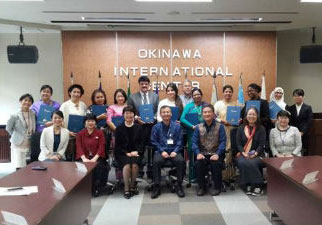JICA Knowledge Co-Creation Program (KCCP) participant’s name: PhD, Ms. Aynura Amirova KCCP program’s name: Strengthening Maternal and Child Health through Public Health Activities Program’s period: October 21, 2016 – December 8, 2016.
At the first, I would like to note that this participation was the most unforgettable part of my life with the best memories of Japan.
By the invitation of the Japan International Cooperation Agency (JICA) during the period of October 19, 2016 to December 9, 2016, I participated in the Knowledge Co-creation Program (group and region focus) for Strengthening Maternal and Child health through Public Health Activities in the city of Urasoe, Okinawa Prefecture, Japan. Representatives from 7 different countries: Afghanistan, Azerbaijan, Uzbekistan, Bangladesh, Haiti, Myanmar and Philippines attended at the training program. The most of lectures were conducted in Japanese with translation into English. During the training course participants were provided with detailed information on the aims, objectives and activities of the Maternal and Child Health of Japan.
It was very good opportunity for me to take part at “Strengthening maternal and child health through public health activities” course offered by JICA.
Many developing countries still face difficulties in providing maternal and child health care services due to lack of human resources, budget, equipment, and facilities. Regional disparity in infrastructure, patient transportation, remote location of regions and inadequate health administration are particular problems that need to be addressed. Improving health systems in developing countries is essential to achieving global health goals.
This program is designed to assist those responsible for nursing management to propose improvement plans that will impact maternal and child health by learning into cases of Okinawa and Japan.

As I learned that Okinawa Prefecture, is made up of around 160 islands, many quite remote. This regional government has long focused on addressing maternal and child health issues. Much of this emphasis stems from post-World War II reconstruction when Okinawans suffered from extremely poor health conditions with inadequate medical staff and facilities. By implementing initiatives to improve its health systems, Okinawa succeeded in achieving Universal Health Coverage.
This program helps me to leverage the success of the experience in Okinawa Prefecture and provides the knowledge, skill, and structure for me to solve maternal and child health issues through public health activities in my home country. The organization of public health care system was presented to group not only in PowerPoint but also by visit different facilities (Governmental PHC, Municipal PHC, Primary and Secondary level Governmental and Private Hospitals, Village Clinic and other).
I would like to note that the Japanese style of providing training course is different. During course it was conducted the feedback from me and other participants by preparation of weekly report, group discussion with record of learning and presentation, study report about the presented information and all of this items help us better understand the meanings and the ways of providing MCH activities. By this way it is possible and useful to determine the main idea and action plan that could be implement in our countries.

During the program I also had the chance to visit a lot of interesting places including Zamami Island and Tokyo. The most important events in Tokyo was the participation on the 10th International Conference on Maternal and Child Health Handbook where I was able to obtain the information about the main key points of implementation MCH Handbook in different countries. In the same study trip, I felt earthquake, saw the first November Snow in the last 5 decades and the beautiful Fuji Mountain with snowy cap.
At the time of staying in Tokyo I had opportunity to visit Azerbaijan Embassy and had meeting with honorable ambassador Mr. Gursel Ismayilzadeh. I would like to thank him and all members of Embassy for warm welcome. I took several journals about Azerbaijan in Japanese and presented all of it at the closing ceremony to organizers.
The social and cultural activities are provided very well! I am lucky because participated in the JICA Global Festival Okinawa 2016 that gave opportunity to learn the culture of different countries through presentation booths and performances. Tokyo Tour and Okinawa Aquarium tour were amazing and unforgettable for me. Also, I saw the traditional Japanese dance by participation on National Theater in Okinawa.

At the beginning of Program every of participants presented Job Report with information about challenges in MCH and efforts of organizations in each country. And at the end of MCH program everyone came back to home country with the formulated idea and action plan how to implement new knowledge. It was good worldwide experience because I explored the medical care system in Japan and in participant’s countries. I learned a lot of new, useful and important from MCH program. And now it is just beginning of my painstaking work (Good luck to all participants!).
At the end, I would like to express great thank for organization of this training program and invitation for participation to Okinawa International Center (OIC), Okinawa Nursing Association (ONA), Cabinet of Ministers of Republic of Azerbaijan, JICA HQ, JICA Uzbekistan Office and JICA Program Coordinator in Azerbaijan.

